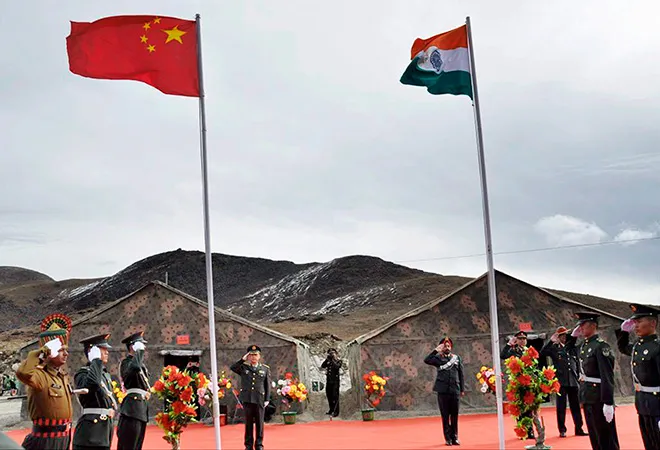India-China relations have gone through a tumultuous phase in the last few years. There have been a series of disputes between the two countries, including China’s fervent opposition to India’s potential membership in the Nuclear Suppliers Group (NSG); Beijing’s shielding of Pakistan and blocking Indian efforts within the UN to designate the Pakistan-based terrorist, Masood Azhar, head of Jaish-e-Mohammed (JeM), as a global terrorist; the Doklam crisis that went on for more than two months last summer; and India’s open opposition to China’s Belt and Road Initiative (BRI).
Though these incidents have cast a long shadow on bilateral relations, it is also true that, following the Doklam conflict and the BRICS Summit thereafter, both New Delhi and Beijing took some steps to stabilise the relationship. Nonetheless, given the bitterness that preceded this recent uptick in ties and the continuing competition between the two, it seems unlikely that the bilateral relations will improve significantly in a way that is sustainable for the future.
There are a couple of indicators of the slight improvement in the relations.
First, the recent visit of the new Indian Foreign Secretary Vijay Gokhale to Beijing may be injecting some fresh momentum to the bilateral relations. Gokhale, fluent in Mandarin, is believed to be an expert on China and someone who will possibly bring some balance to the rocky relationship. Gokhale was notably credited with bringing the Doklam crisis to the finish line without firing a bullet.
The recent visit of the new Indian Foreign Secretary Vijay Gokhale to Beijing may be injecting some fresh momentum to the bilateral relations.
The Global Times, in its coverage of the visit, highlighted the meeting between Chinese State Councilor Yang Jiechi and Gokhale and added that they agreed to “deepen strategic communication, beef up mutually beneficial cooperation and properly settle sensitive issues, based on the consensus reached by leaders of the two countries.” The official Indian view also appeared positive: the Indian Embassy in Beijing, in a statement, said the two sides “noted the need to build on the convergences between India and China and address differences on the basis of mutual respect and sensitivity to each other’s concerns, interests and aspirations. Both sides underlined that as two major countries, sound development of relations between India and China is a factor of stability in the world today.”
This positive turn, while welcome, is somewhat additionally surprising considering earlier concerns among some in China about Ghokale. When he was appointed, The Global Times in an opinion piece identified Gokhale as a “hardliner” on China. The author of that piece, Liu Zongyi, added that “his hard-line stance toward China have won him the appreciation of Prime Minister Narendra Modi, which further contributed to his appointment as the foreign secretary.”
Second, there has been generally positive reaction in India — albeit still tinged with some suspicion — about China agreeing to place Pakistan on the FATF (Financial Action Task Force) terror financing grey list. Subsequently, when China took over as the vice president of FATF, India promptly congratulated it, with the Indian MEA spokesperson tweeting his congratulations and hoping “that China would uphold & support the objectives & standards of FATF in a balanced, objective, impartial & holistic way.” There has been speculation in the Indian media, although the government has not divulged anything, that there may have been a deal between India and China on this: support for China’s vice presidency in return for China agreeing to put Pakistan on the grey list.
There has been generally positive reaction in India — albeit still tinged with some suspicion — about China agreeing to place Pakistan on the FATF (Financial Action Task Force) terror financing grey list.
For China, gaining India’s vote for FATF was possibly sufficiently important enough for it to not object to placing Pakistan on the grey list. Moreover, it is worth noting the broader context at play here: the move within the FATF was sponsored by a number of other countries, including the United States, the United Kingdom, and France, and China was also not the only one to withdraw its support to Pakistan: Turkey and Saudi Arabia also initially resisted the US move, and reportedly withdrew their support for Pakistan only in the final phase. The limitations of the grey list are also worth keeping in mind: though this move will hurt Pakistan, making it difficult for Pakistan to raise money from overseas, including international monetary agencies, Pakistan is no stranger to the list, having been on it earlier from 2012 to 2015.
China’s change of mind with regard to Pakistan may have been prompted by a couple of other factors too that extend beyond India, in addition to a possible bargain with New Delhi itself. One, China is itself concerned about the growing threat of terrorism to the China-Pakistan Economic Corridor (CPEC). China’s talks with Baloch militants last week are an indicator of those growing concerns, which pours some cold water over some of the sensationalism around the sunny future for China-Pakistan relations.
Those broader considerations are worth keeping in mind. Though it is possible to see the Ghokale visit and the FATF as signs of improving bilateral relations, the reality may be more complicated. Furthermore, there is still no shortage of problems between the two sides old and new, including the recent spat over the Maldives and the continuing wariness about what might happen in Doklam. These realities suggest that we are likely to continue to see tensions ahead, even with this welcome uptick in ties.
This commentary originally appeared in The Diplomat.
The views expressed above belong to the author(s). ORF research and analyses now available on Telegram! Click here to access our curated content — blogs, longforms and interviews.




 PREV
PREV


